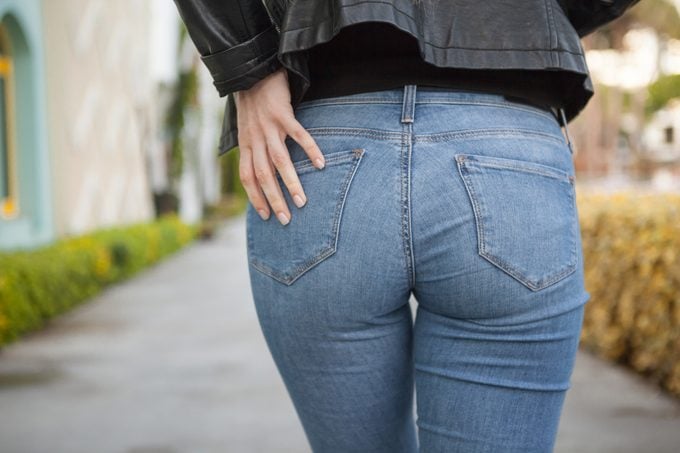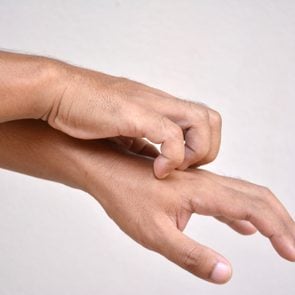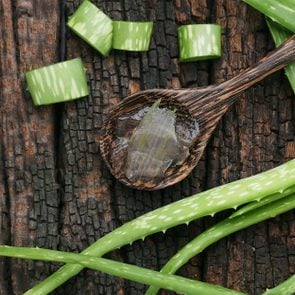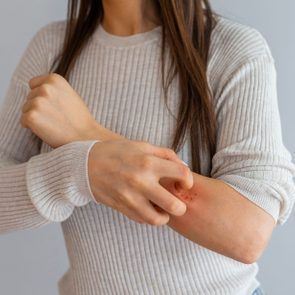Got an Itchy Bum? Here Are 16 Reasons Why—and How to Treat It
Updated: Jun. 15, 2021
Stool changes, aggressive wiping, and other issues (including parasites known as pinworms) can cause you to have an itchy butt. Here's how to stop anal itching.
Our editors and experts handpick every product we feature. We may earn a commission from your purchases.
Why does my butt itch?
An itchy butt may sound like a punchline, but it’s no laughing matter.
“It sounds like a joke, but my itchy butthole affected my ability to live my normal life because I couldn’t think about anything else,” says Mae Larson, a 24-year-old graduate student who acquired the scratchy problem on a research trip to Brazil.
“Itching it provided so much relief, but there’s not really a delicate way to do that, and I was around people all the time,” she says. “Let me tell you, I suffered.”
Eventually, she became so desperate that she visited a farmacêutico, a pharmacist who also acts like a doctor and can provide medical advice and treatments.
After enlisting a colleague to help her figure out how to say “itchy butt” in Portuguese—”a whole other level of humiliation,” she says—the pharmacist diagnosed her with parasites, likely pinworms, and prescribed her an antiparasitic medication. Within a few days, her embarrassing problem was solved.
While she no longer suffers from the itching, the memory is still pretty embarrassing. In fact, we’re using her middle name because, well, “itchy butt isn’t exactly the kind of thing I want people to find when they Google my name,” she says.
But perhaps this is exactly the kind of thing we should be discussing more.
Itchiness on the buttocks or in or around the anus is more common than you may think. Although there’s not much research into the frequency, this is one of those things that everyone will likely experience at some time or another during their lives, says Niket Sonpal, MD, a gastroenterologist, internist, and faculty member at Touro College of Medicine in New York City. (Here are some health conditions that can cause itchy skin in general.)
Reasons why your anus itches
Anal itching, officially called pruritus ani, is an extremely common condition.
You may feel constant itching, or it may come and go. Rarely is it serious, says Dr. Sonpal.
Here are some reasons you may be experiencing it.
Poor hygiene
The most common cause of itching in or around the anus is leftover fecal matter.
“If you don’t wipe well, the poop that is left on your butt can cause burning and itching,” he says.
You can remedy this problem by wiping carefully or using a bidet toilet seat attachment.
Take extra time to make sure you’ve done a thorough job and learn how to wipe your butt correctly.
Aggressive wiping
On the other hand, being overly fastidious in cleaning your anus can also cause itching.
Scrubbing the area with dry toilet paper can lead to irritation, dryness, and itching.
Soft toilet paper or a bidet may feel more gentle. Only clean as much as is necessary and never use harsh cleansers on that area, as they can increase itching.
Hemorrhoids
Veins in your rectum can become swollen and inflamed, causing hemorrhoids. This common condition is characterized by sharp pain, burning, and itching in or around the anus, particularly when sitting or pushing out a bowel movement.
Mild cases can be treated with over-the-counter creams, or you can try one of these methods for treating hemorrhoids at home.
But if those don’t provide enough relief, or if the hemorrhoids worsen, talk to your doctor about medical options.
Pinworms
Prepare to be grossed out. You get pinworms after swallowing their eggs, often in contaminated food or water. These tiny parasites then hatch and take up residence in your intestines.
When you sleep, the females emerge through your anus and lay eggs on the surrounding skin, which is what causes the characteristic itching that Mae experienced.
They’re treated with antiparasitic medications. Most are available only by prescription, but one—pyrantel pamoate—is available over the counter at most pharmacies.
Stool changes
Both diarrhea and constipation can irritate your anus, causing it to itch. It’s important to figure out what the underlying causes of your stool changes are and treat those. In the meantime, over-the-counter anti-itch creams or antihistamine medications can provide some relief.
(These are the different types of poop and what they mean.)
Diet
As anyone who’s eaten spicy peppers knows, some foods can really irritate your anus when you poop them out. This irritation can cause burning and itching, which is usually temporary and resolves on its own. Spicy foods, coffee, energy drinks, and dairy are the most common culprits, but this can be highly individual.
“These foods loosen the anal muscles, which can allow feces to leak out, leading to an itch,” explains Dr. Sonpal.
If this is a chronic issue, figure out which foods may be causing your itching and try eliminating them to see if that solves the problem.
Infection
A bacterial, viral, or fungal infection of the anus can cause itching. Generally, the itching is accompanied by other symptoms, like blood (often when wiping), swelling, fever, pain, tenderness, and redness.
If you show signs of infection, call your doctor immediately. Some sexually transmitted infections, like herpes, have itching as a symptom.
Chronic illness
Itching is a symptom of some chronic illnesses, including diabetes, thyroid conditions, Crohn’s disease, irritable bowel syndrome, inflammatory bowel disease, and some types of cancers.
If you’re dealing with chronic itchiness and you have other symptoms, your doctor may want to do additional tests to rule out these diseases.

Reasons your butt cheeks itch
Your buttocks are covered with skin and are therefore susceptible to all the usual skin conditions that cause itchiness, says Marisa Garshick, MD, a dermatologist at MDCS Dermatology and clinical assistant professor of dermatology at NewYork Presbyterian-Weill Cornell Medical Center in New York City.
In fact, because they are generally kept in a warm, moist, dark environment, they may be more prone to some types of conditions than the skin on your other cheeks. That’s especially true if you have a tendency to stay in sweaty or damp undies or tight pants for long periods of time, she adds.
(Do you know the times you should never, ever scratch an itch?)
Diaper rash
Yes, adults can get this skin condition too. Skin that is kept in a warm, wet environment may develop an itchy, red, painful rash or bumps. While it’s more common in babies who wear diapers, adults who sweat a lot in that area or who experience bladder leakage are particularly susceptible.
Treat it with diaper cream and prevent it by keeping your butt dry and clean.
Psoriasis
This autoimmune condition is characterized by bumpy, scaly patches on the skin that itch and flake. Sometimes they may be painful. It’s most often found on the scalp, back, or elbows, but it’s totally possible to get it on your butt as well.
There isn’t a cure, but there are many treatments available to control it. Talk to your doctor if you suspect you have psoriasis.
Eczema
Eczema, another very common skin condition, is characterized by itchy, red rashes that can sometimes crack and bleed. It often goes through flare-ups followed by periods of remission.
Mild eczema can be controlled with over-the-counter creams, but if it’s severe, you should see a doctor about other treatment options.
Allergic reactions
Skin rashes and itchiness are common signs that your skin is sensitized to something. Things that specifically affect the skin on your buttocks could include pool chemicals or ingredients in your laundry detergent, body lotion, or other skin care product you use in that area.
Been out in the woods? Your itchy backside may have poison ivy, poison oak, or poison sumac. If the oil from one of these plants touches your skin, you can break out in a super-itchy rash. Sure, you’re probably keeping your bum covered during hikes, but if you need to do your business in the woods, make sure you’re not wiping with
Your underwear
Wearing ill-fitting or damp underwear can cause itchiness from rubbing and chafing. Certain fabrics, like lace or polyester, can also feel very itchy on your skin.
Invest in comfortable, well-fitting underwear and change damp undies as soon as possible.
Your bathing routine
Some people’s skin reacts harshly to the dyes, fragrances, or detergents used in hygiene products.
If your butt routinely itches after a shower, try swapping out your soap, shampoo, shave gel, and body wash.
Sitting or standing in very hot water for a period of time can also cause a heat rash on your butt, which can be very itchy.
Sunburn
People often forget to put sunscreen on their rear ends, but if you are spending a lot of time swimming face down, snorkeling, or laying out on your stomach, you can burn the sensitive skin on your backside. The burn itself may feel itchy but that itchiness will intensify as your skin peels as part of the healing process.
Prevent it by applying sunscreen to all exposed areas of your body. Treat a sunburn on your butt just like you would any sunburn: with cool compresses, aloe vera, or sunburn gel.
Insect bites
Mosquitoes, chiggers, spiders, ticks, and other bugs love the warm dark area around your butt and groin.
A bug bite often feels very itchy, especially if you got bit more than once. It may also swell, turn red, and become painful.
If you show any signs of infection or you develop a bullseye rash (a characteristic of tick-borne Lyme disease), call your doctor right away.
Next, here are some home remedies for itchy skin.























